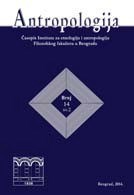ORIJENTALNO DOBA U KULTURI SEĆANJA SEFARDA U BEOGRADU IZMEĐU DVA SVETSKA RATA
Oriental times in the culture of remembrance of the Sephardim in Belgrade between the two world wars
Author(s): Ivana Vučina Simović, Marija MandićSubject(s): Jewish studies, Islam studies, Comparative Studies of Religion, Interwar Period (1920 - 1939)
Published by: Институт за етнологију и антропологију
Keywords: culture of remembrance; communicative and cultural memories; Jews (Sephardim, Ashkenazim); Jewish quarter (Jalija); Belgrade under the Ottoman rule
Summary/Abstract: After being exiled from the Iberian Peninsula (1492), large numbers of Sephardic Jews settled in the territories under the Ottoman rule, and in Belgrade after 1521, when it was conquered by the Ottomans. The administrative and political system of the Ottoman Empire made possible for the Belgrade Sephardim, as well as for other non-Muslims, to live piously and patriarchally in a separate city quarter (mahala) for centuries. They were tightly connected by family and business ties with other Sephardic communities all around the Empire, and only superficially to the members of the other ethno-confessional groups living in their immediate surroundings. The changes occurred only in the 19th century, after the modern Serbian nation-state was established, and the Belgrade Jewish community entered the process of an intensive modernization. In this article we analysed how oriental times and the Ottoman heritage were remembered in the texts describing the past of Belgrade Jews. The corpus consists of Jewish publications which appeared in Serbian language between the two World Wars. They testify to the specificity of the Jewish communicative and cultural memory which praise the position of the Jews under the Ottomans and the traditional way of life in piety and according to the patriarchal rules, but they also bear a resemblance to the discourses of the European and the Balkan orientalism, as well as of the modern Jewish authors.
Journal: Antropologija
- Issue Year: 19/2019
- Issue No: 3
- Page Range: 113-143
- Page Count: 31
- Language: Serbian

